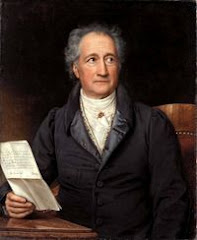This quarter I have taken German Middle Ages history and German 20th Century history simultaneously. I find the links between the past and the present really interesting - if you look back at the Middle Ages, you see so much of why the events of the past century transpired.
I the aspects of Germany's desire for a national identity especially striking. I knew from my 20th Century German History class that in the late 1800's that Germany was experiencing a huge boom under the cautious hand of Otto von Bismarck, and then under the not-so-cautious hand of Wilhelm the Second, but understanding the significance of the Thirty Year's War increased my understanding so much more. The German identity had been so completely destroyed by this war, and had so nearly succumbed to the unthinkable (i.e. French culture), that the glorious future that seemed to be shining in the early 1900's would have been that much more dear - German culture had been on the brink of oblivion, and yet they had fought their way back. It's no small wonder that they would have thrown themselves into WWI with the abandon that only comes from those who have been close to death and returned. They felt themselves invincible, indomitable, as evinced by their overwhelming support for the decision to back Austria in their conflict.
Yet this wild spirit cannot be understood so well without the knowledge of the centuries before, and particularly, the Thirty Year's War, and the great suffering the German people had already endured and overcome.
Ruth Welsh
Sunday, March 9, 2008
Subscribe to:
Post Comments (Atom)







.jpeg)


1 comment:
I could not agree more: there is absolutely no way that one could understand the mindset of the German people in the 19th and 20th centuries without first understanding the turbulence that their ancestors experienced. The violence and destruction of the Thirty Years War would have irrevocably scarred not just the physical landscape around them, but rather also the cultural mindset of the survivors. Having inherited a devastated country-side and widespread economic regression, the next few generations would have been adversely affected by a lack of basic goods and economically backwardness compared to the surrounding countries not so gravely afflicted. Even this feeling of insecurity and insignificance would linger in the mindsets of the German people as they would later seek cultural, economic, and eventually, political strength. It may be no wonder that the following period of Baroche culture would be dominated by themes of death and the transitory nature of existence coupled with princely displays of grandeur and wealth. After decades of infighting after their leaders aligned themselves with opposing invaders, the German lands would also lack a single cultural identity, leaving a denominationally-mixed populace with wide disparities between the principalities. Even as the German people of later times may not have experienced the terrors of the Thirty Years War first hand, critical events such as this also feed into a kind of collective memory, determining cultural history which far outlive any survivors. The Thirty Years War affected the German landscape, economy, and culture so extremely that it may well be the most influential factor leading to the delay of German nationhood and later hyper-nationalism of the twentieth century.
- Garth Fox
Post a Comment